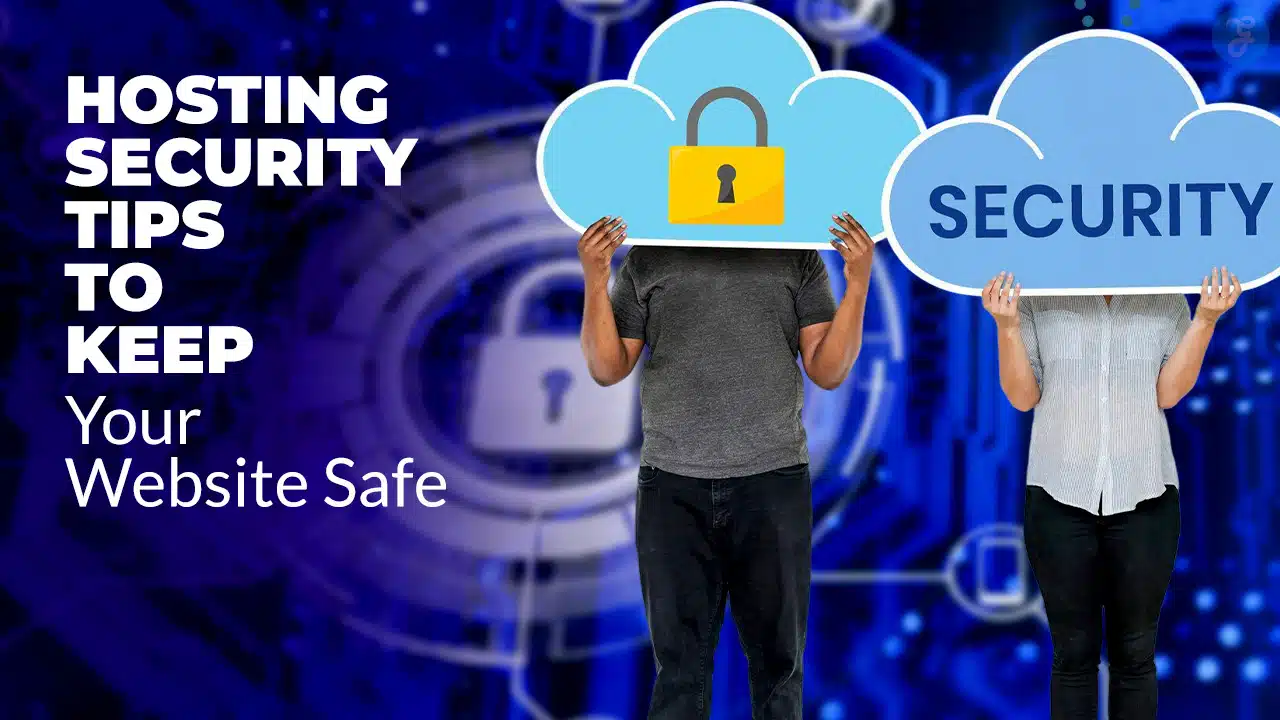In today’s digital landscape, website security is more crucial than ever. Cyber threats are evolving rapidly, and businesses, bloggers, and eCommerce sites alike need to take proactive measures to protect their data and users.
From malware attacks to DDoS threats, ensuring robust hosting security is essential for maintaining website integrity, performance, and trust.
This article provides 10 hosting security tips to keep your website safe, helping you mitigate risks and strengthen your site’s defense against potential cyberattacks.
By implementing these hosting security best practices, you can prevent unauthorized access, secure sensitive data, and ensure seamless user experience.
Why Hosting Security Matters
With hackers launching over 2,200 attacks daily, websites have become prime targets for cybercriminals. From personal blogs to enterprise websites, no site is completely immune to security threats. A single vulnerability in your hosting environment can lead to data breaches, financial loss, and reputational damage.
Common Vulnerabilities in Web Hosting
- Weak passwords leading to unauthorized access
- Outdated software making sites susceptible to exploits
- Malware infections compromising sensitive user data
- SQL injection attacks affecting databases
- DDoS attacks overwhelming server resources
Impact of Poor Security on Websites and Businesses
- Loss of customer trust
- SEO penalties from Google for hosting malware
- Potential legal consequences for data breaches
- Downtime affecting business revenue
Implementing these hosting security tips to keep your website safe is the first step in securing your online presence.
Essential Hosting Security Tips
Website security starts with a solid hosting foundation. Your hosting provider plays a critical role in protecting your website from cyber threats, malware, and unauthorized access. By following these hosting security tips to keep your website safe, you can minimize risks and ensure long-term protection.
1. Choose a Reliable and Secure Web Hosting Provider
Selecting a secure hosting provider is the foundation of website security. Not all hosting companies offer the same level of protection. A secure web host ensures uptime, data protection, and compliance with security best practices. When choosing a host, consider:
Key Security Features to Look for:
- SSL Certificates (for encrypting data transmission)
- DDoS Protection to prevent traffic overload attacks
- Automated Backups for disaster recovery
- 24/7 Security Monitoring
- Firewall Protection
- Malware Scanning and Removal
- Two-Factor Authentication (2FA) for Admin Access
- Secure File Transfer Protocols (SFTP & FTPS)
Recommended Hosting Providers for Security:
| Hosting Provider | Security Features | Best For |
| SiteGround | SSL, AI-based security, daily backups, 24/7 monitoring | Small to medium sites |
| Kinsta | DDoS protection, malware scanning, Google Cloud Platform security | WordPress sites |
| Cloudways | Dedicated firewalls, two-factor authentication, bot protection | Developers & agencies |
| A2 Hosting | Perpetual security, HackScan protection, free SSL | High-speed hosting needs |
| Bluehost | Free SSL, daily backups, SiteLock Security | Beginners & small businesses |
Choosing a hosting provider with robust security measures ensures long-term website safety, prevents vulnerabilities from being exploited, and enhances your website’s performance. It is essential to research each hosting provider’s security offerings and ensure they align with your website’s specific needs.
2. Enable SSL Certificates for Encrypted Data Transfer
An SSL certificate encrypts data between a visitor’s browser and your server, ensuring secure transactions. Google prioritizes SSL-secured sites in search rankings, making it a must-have for security and SEO. Additionally, SSL certificates help build customer trust by displaying the secure padlock icon in browsers, which assures visitors that their data is protected.
SSL comes in different types, including:
- Domain Validation (DV) SSL: Basic encryption, ideal for blogs and personal websites.
- Organization Validation (OV) SSL: Provides moderate security with business verification.
- Extended Validation (EV) SSL: High-trust security for eCommerce and financial sites.
How to Enable SSL on Your Website:
- Purchase or get a free SSL certificate (Let’s Encrypt provides free options, while paid options include DigiCert and Comodo).
- Install SSL via your hosting provider’s dashboard or manually via cPanel.
- Redirect all HTTP traffic to HTTPS using an .htaccess file or a plugin (for WordPress users, plugins like Really Simple SSL help automate this process).
- Check for mixed content errors and update internal links to use HTTPS.
- Renew SSL certificates before expiration to prevent security warnings.
Pro Tip: Always opt for Extended Validation (EV) SSL for high-trust sites such as eCommerce or financial services. Also, ensure that all subdomains are secured with a Wildcard SSL Certificate to provide complete site coverage.
3. Keep Your CMS, Plugins, and Themes Updated
Outdated software is a leading cause of security breaches. Hackers exploit known vulnerabilities in outdated CMS (like WordPress), plugins, and themes to gain unauthorized access. Without regular updates, security holes remain open for cybercriminals to exploit, potentially leading to malware infections and data breaches.
Best Practices for Software Updates:
- Enable auto-updates for your CMS (WordPress, Joomla, etc.) whenever possible.
- Manually review and update plugins/themes regularly to ensure compatibility and security.
- Remove unused plugins and themes to reduce security risks and eliminate unnecessary vulnerabilities.
- Use trusted plugins from official repositories like WordPress.org or Joomla Extensions Directory.
- Test updates in a staging environment before applying them to your live site to prevent compatibility issues.
- Enable vulnerability alerts through security plugins like Wordfence or Sucuri to receive timely notifications about outdated or compromised software.
- Set up automatic database and file backups before major updates to ensure you can restore your website in case of issues.
- Ensure your web hosting provider supports the latest PHP versions, as outdated PHP can also introduce security risks.
Keeping your software up to date is one of the most effective ways to prevent cyberattacks and maintain a secure hosting environment.
4. Implement Strong Password Policies and Two-Factor Authentication
Weak passwords are easy to crack, making your hosting account vulnerable to brute-force attacks.
Password Security Best Practices:
- Use 12+ character passwords with numbers, symbols, and uppercase/lowercase letters.
- Never reuse passwords across multiple platforms.
- Enable Two-Factor Authentication (2FA) for an additional security layer.
5. Regularly Back Up Your Website Data
A solid backup strategy ensures that you can recover your website in case of an attack or accidental data loss.
Backup Methods:
| Backup Type | Frequency | Storage Location |
| Full Site Backup | Weekly | Cloud (Google Drive, Dropbox) |
| Database Backup | Daily | Server & external storage |
| Incremental Backup | Hourly | Hosting provider |
6. Use a Web Application Firewall (WAF) for Protection
A Web Application Firewall (WAF) acts as a protective barrier between your website and incoming traffic, filtering out malicious requests and preventing attacks such as SQL injection, cross-site scripting (XSS), and distributed denial-of-service (DDoS) attacks.
Benefits of Using a WAF:
- Blocks malicious traffic before it reaches your site.
- Provides real-time threat monitoring and mitigation.
- Enhances website performance by filtering unnecessary traffic.
- Protects against zero-day vulnerabilities and known exploits.
Best WAF Solutions:
| WAF Provider | Features | Best For |
| Cloudflare WAF | DDoS protection, CDN integration, bot mitigation | All websites |
| Sucuri Firewall | Malware scanning, blacklist removal, SSL support | WordPress & eCommerce |
| Akamai Kona Site Defender | AI-driven threat detection, enterprise security | Large businesses & enterprises |
Using a WAF adds an extra layer of security, ensuring that threats are neutralized before they can impact your website.
7. Monitor and Restrict File Permissions
File permissions define who can read, write, or execute files on your server. Improperly set permissions can allow hackers to modify or access sensitive data, increasing the risk of security breaches.
Recommended File Permissions:
| File Type | Recommended Permission |
| Public HTML Files | 644 (readable by all, writable only by the owner) |
| Folders/Directories | 755 (read, write, and execute for owner; read and execute for others) |
| Configuration Files | 600 (only owner can read and write) |
Restricting file permissions reduces the chances of unauthorized modifications and enhances your site’s security posture.
8. Scan for Malware and Vulnerabilities Regularly
Regularly scanning your website for malware and vulnerabilities is essential for preventing cyber threats from compromising your data and user experience. Hackers often inject malicious code, spyware, or trojans into websites, making them dangerous for visitors and leading to blacklisting by search engines.
Best Practices for Malware Scanning:
- Use automated security scanners to detect threats in real time.
- Schedule daily malware scans to identify and remove suspicious files.
- Employ server-side security solutions to monitor unauthorized changes.
- Activate Google Search Console alerts to receive notifications of security issues.
- Choose hosting providers that offer integrated malware scanning and removal tools.
Top Malware Scanning Tools:
| Security Tool | Features | Best For |
| Wordfence Security | Real-time malware scanning, firewall protection | WordPress users |
| Sucuri SiteCheck | Free website scanner, blacklist monitoring | Small businesses |
| MalCare | Instant malware removal, deep scanning | Large sites & enterprises |
By implementing hosting security tips to keep your website safe, including regular malware scanning, you ensure your site remains free from cyber threats and provides a secure experience for visitors.
9. Secure Your Database and Prevent SQL Injections
Your website’s database stores valuable information such as user credentials, content, and payment details. Without proper security measures, hackers can exploit vulnerabilities through SQL injection attacks, leading to data breaches and unauthorized modifications.
How to Secure Your Database:
- Use parameterized queries and prepared statements to prevent SQL injection.
- Change the default database table prefix to make attacks more difficult.
- Restrict database access permissions to minimize exposure to threats.
- Enable firewall rules that block unauthorized database access.
- Regularly back up your database to prevent data loss in case of an attack.
SQL injection remains one of the most common website threats, but by following proper security measures, you can significantly reduce the risks and keep your database safe.
10. Protect Against DDoS Attacks with Robust Security Measures
DDoS (Distributed Denial-of-Service) attacks overwhelm a website with excessive traffic, causing slow performance or complete downtime. These attacks can affect businesses of all sizes, leading to revenue loss and damage to brand reputation.
How to Prevent and Mitigate DDoS Attacks:
- Use DDoS protection services like Cloudflare, Akamai, or AWS Shield.
- Enable rate limiting to restrict excessive traffic requests from single IPs.
- Deploy a Content Delivery Network (CDN) to distribute traffic and reduce server load.
- Monitor website traffic patterns using server logs and analytics tools.
- Implement automated threat detection systems to block malicious traffic in real time.
By applying these hosting security tips to keep your website safe, you can protect your site from DDoS attacks and ensure a stable online presence for your users.
Wrap Up
Cyber threats are evolving rapidly, and businesses, bloggers, and eCommerce sites alike need to take proactive measures to protect their data and users. From malware attacks to DDoS threats, ensuring robust hosting security is essential for maintaining website integrity, performance, and trust.
This article provides 10 hosting security tips to keep your website safe, helping you mitigate risks and strengthen your site’s defense against potential cyberattacks.
By implementing these hosting security best practices, you can prevent unauthorized access, secure sensitive data, and ensure a seamless user experience.




































